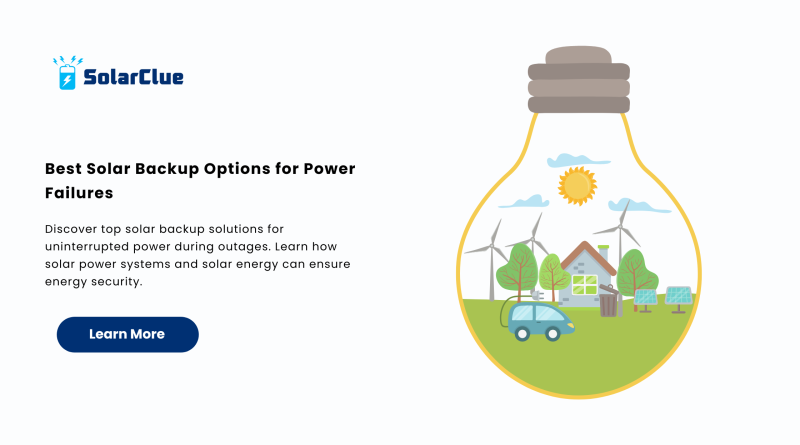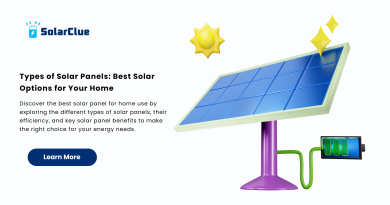Best Solar Backup Options for Power Failures
In today’s world, where electricity disruptions are increasingly common due to grid failures, weather disturbances, or infrastructure limitations, having a reliable backup is essential. One of the most sustainable and efficient solutions is a solar backup system. Leveraging solar energy for backup not only ensures power security but also reduces reliance on fossil fuels. In this blog, we’ll dive deep into the best solar backup options available, their benefits, and how you can choose the right solar power system for your needs.
Table of Contents
- 1 Why Choose Solar Backup Over Traditional Alternatives?
- 2 Types of Solar Backup Systems
- 3 Key Components of a Solar Backup Setup
- 4 Factors to Consider When Choosing a Solar Backup System
- 5 Benefits of Solar Backup Solutions
- 6 Common Myths About Solar Backup
- 7 Popular Solar Backup Brands in India
- 8 How to Install a Solar Backup System
- 9 Government Incentives & Subsidies in India
- 10 Real-Life Use Cases of Solar Backup
- 11 Long-Term ROI of Solar Backup Systems
- 12 Tips for Maximizing Solar Backup Efficiency
- 13 Conclusion
- 14 FAQs
Why Choose Solar Backup Over Traditional Alternatives?
Reliability in Outages
Unlike fuel-based generators that require continuous refueling and maintenance, solar backup systems offer a clean, renewable source of energy that functions seamlessly during power cuts.
Eco-Friendly Solution
Solar energy is a green, sustainable power source. By investing in a solar power system, you contribute to reducing carbon footprints and supporting environmental conservation.
Cost-Efficiency
After the initial installation cost, the running cost of solar power systems is minimal. This makes it a smart financial choice in the long run.
Types of Solar Backup Systems
1. Grid-Tied Systems with Battery Backup
This is one of the most popular setups. It combines the benefits of a traditional grid connection with the assurance of a solar backup battery during outages.
2. Off-Grid Solar Systems
Ideal for remote areas or locations with frequent power outages, these systems operate independently from the grid, relying entirely on solar energy.
3. Hybrid Solar Systems
These offer maximum flexibility by integrating both grid and solar power, along with battery storage. They automatically switch to backup mode during power failures.
Key Components of a Solar Backup Setup
Solar Panels
These are the heart of any solar power system. They absorb sunlight and convert it into usable electricity.
Inverters
Inverters convert the DC power generated by solar panels into AC power used by household appliances.
Battery Storage
Essential for storing excess solar energy, ensuring availability during non-sunny hours or emergencies.
Charge Controllers
They regulate the power going into the batteries, preventing overcharging or undercharging.
Factors to Consider When Choosing a Solar Backup System
Power Requirements
Calculate your average daily power consumption to determine the capacity of your solar power system.
Battery Capacity
Choose batteries with enough capacity to meet your backup needs. Lithium-ion batteries are preferred for their longevity and efficiency.
Budget
Although the upfront cost may be high, various government subsidies and incentives make solar solutions more affordable.
Maintenance
Opt for systems that offer easy maintenance and come with reliable warranties.
Benefits of Solar Backup Solutions

Energy Independence
No more worrying about grid failures. Your solar backup ensures uninterrupted power.
Low Operating Cost
Once installed, solar systems incur very low operational expenses.
Scalability
You can start small and scale up your solar power system as your energy needs grow.
Increases Property Value
Homes with solar energy systems are more attractive to buyers and may fetch higher market prices.
Common Myths About Solar Backup
“Solar Backup Only Works in Sunny Weather”
Modern solar power systems come with battery storage that allows energy usage even during cloudy days or at night.
“Too Expensive to Install”
With government incentives, tax credits, and dropping prices, solar has become more accessible than ever.
“Requires High Maintenance”
Today’s systems are designed to be low-maintenance with long service life.
Popular Solar Backup Brands in India
Tata Power Solar
Known for reliability and widespread service networks.
Loom Solar
Offers advanced lithium battery-based solar backup systems.
Microtek
Ideal for home use with budget-friendly solutions.
How to Install a Solar Backup System
Step 1: Site Assessment
Evaluate the amount of sunlight your property receives and available space for solar panels.
Step 2: System Design
Customize the system as per your energy needs and budget.
Step 3: Installation
Ensure professional installation to meet safety and performance standards.
Step 4: Monitoring & Maintenance
Use smart monitoring tools to keep track of energy generation and usage.
Government Incentives & Subsidies in India
MNRE Subsidy Scheme
The Ministry of New and Renewable Energy (MNRE) offers subsidies for residential rooftop solar power systems.
Net Metering Benefits
Feed excess power back to the grid and receive credit, reducing your electricity bill.
Real-Life Use Cases of Solar Backup
Residential Use
Many households in urban and rural areas are switching to solar backup to tackle frequent load shedding.
Commercial Use
Small businesses benefit from lower operational costs and uninterrupted service.
Healthcare & Schools
Essential institutions ensure critical operations continue during power failures.
Long-Term ROI of Solar Backup Systems
Break-Even Point
Most users recover their investment within 5-7 years through energy savings.
Increased Efficiency
Modern solar power systems are highly efficient, further accelerating ROI.
Tips for Maximizing Solar Backup Efficiency
- Keep panels clean and unobstructed
- Use energy-efficient appliances
- Monitor system performance regularly
Conclusion
Solar backup systems are no longer a luxury but a necessity in today’s power-dependent world. They offer a sustainable, cost-effective, and reliable solution to power failures. By integrating solar power, you not only ensure energy independence but also contribute to a greener planet.
To explore customized solar solutions, visit our official platform at SolarClue.com. Dive deeper into solar energy innovations at our knowledge hub: blog.solarclue.com.
FAQs
1. What is the best solar backup system for home use?
A hybrid system with battery storage is ideal as it provides grid flexibility and power during outages.
2. Can I run AC appliances on solar backup?
Yes, as long as your solar power system has the capacity and proper inverter.
3. How long do solar batteries last?
On average, 5 to 15 years depending on battery type and usage.
4. Are solar backup systems safe?
Yes, they are designed with multiple safety features and are environment-friendly.
5. Is solar backup worth the investment?
Absolutely. With rising energy costs and frequent power failures, a solar backup system offers long-term benefits.
Check out our solutions today at solarclue.com and transform your energy future!



